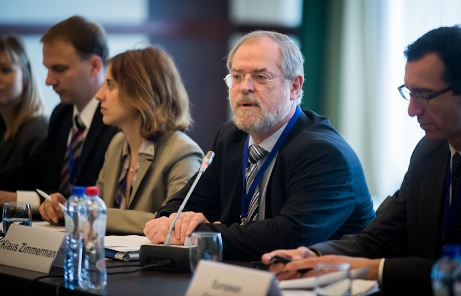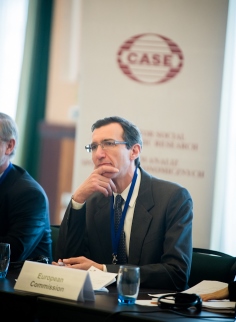Results of the project on migration between the EaP countries and the EU discussed in Brussels
 The final seminar concluding the two-year project “Cost and Benefits of Labour Mobility between the EU and the Eastern Partnership Partner Countries” took place in Brussels on June 25th, 2013. The event gathered government representatives from the selected EU states (Italy, Poland, Czech Republic, Romania, Slovakia and Sweden) and the selected EaP countries (Moldova, Georgia, Armenia, Azerbaijan, Ukraine and Belarus) as well as the representatives of civil society (IOM, ICMPD) and academia (CEU, EUI, Warwick University, Trinity College Dublin).
The final seminar concluding the two-year project “Cost and Benefits of Labour Mobility between the EU and the Eastern Partnership Partner Countries” took place in Brussels on June 25th, 2013. The event gathered government representatives from the selected EU states (Italy, Poland, Czech Republic, Romania, Slovakia and Sweden) and the selected EaP countries (Moldova, Georgia, Armenia, Azerbaijan, Ukraine and Belarus) as well as the representatives of civil society (IOM, ICMPD) and academia (CEU, EUI, Warwick University, Trinity College Dublin).

The first of four thematic panels, “Migration from the Eastern Partnership Countries and Policy Conclusions”, commenced with a presentation delivered by prof. Klaus F. Zimmermann. The speaker gave some characteristics of the EU-EaP migration, pointing to the important role it plays in facilitating the economic restructuring. In his policy recommendations, he called for, inter alia, increased institutional coordination and for incorporating migration issues in national strategies and sectoral action plans. His presentation was followed by a discussion chaired by Martin Kahanec from the CEU.
The second panel, devoted to “EaP workers in EU Labour Markets: Unleashing potential for mutual gains”, was chaired by Matthias Luecke, CASE Fellow. It included the presentation delivered by Martin Kahanec, which was then followed by comments of the representatives from Sweden and Poland, who shared their countries’ experiences with migration from the EaP countries. Erik Reho (Swedish Migration Board) emphasized the inefficiency of schemes and quotas and pointed to the fact that the market allocates resources more effectively. Adrian Chrobot (Mission of Poland to the EU), on the other hand, briefly shared a good practice example from Poland, which introduced systems of certificates.
The third panel, titled: “Labour Migration from the EaP: The Potential for Mutual Gains”, was chaired by Allan Barret from the Trinity College Dublin. The main presenter, Matthias Luecke, CASE Fellow, underlined the large benefits resulting from labor migration for both migrants and their families and for socio-economic development of their countries. He also argued for implementing adequate labor migration policies in EaP countries and, on the EU level, assigning high priority to the implementation of the Single Permit initiative, which would contribute to improving social security for labour migrants and stabilize host country pension systems.
The “Panel discussion on policy recommendation”, chaired by Klaus F. Zimmermann, provided a platform for discussion among all the participants.
 The last point on the agenda was the “Raport of the rapporteur”, during which Mathias Luecke wrapped up the four sessions. Among the main policies recommended to move forward was a need to provide information and support and eventual settlement or re-integration of migrants. It was also agreed that policies should not be narrowed down to few areas, such as border control, but should rather constitute a comprehensive overview of the areas affected by migration. Although, as was stated, a full liberalization is highly unlikely, the participants agreed that a gradual liberalization would address many concerns.
The last point on the agenda was the “Raport of the rapporteur”, during which Mathias Luecke wrapped up the four sessions. Among the main policies recommended to move forward was a need to provide information and support and eventual settlement or re-integration of migrants. It was also agreed that policies should not be narrowed down to few areas, such as border control, but should rather constitute a comprehensive overview of the areas affected by migration. Although, as was stated, a full liberalization is highly unlikely, the participants agreed that a gradual liberalization would address many concerns.
For more information on the project click here.

